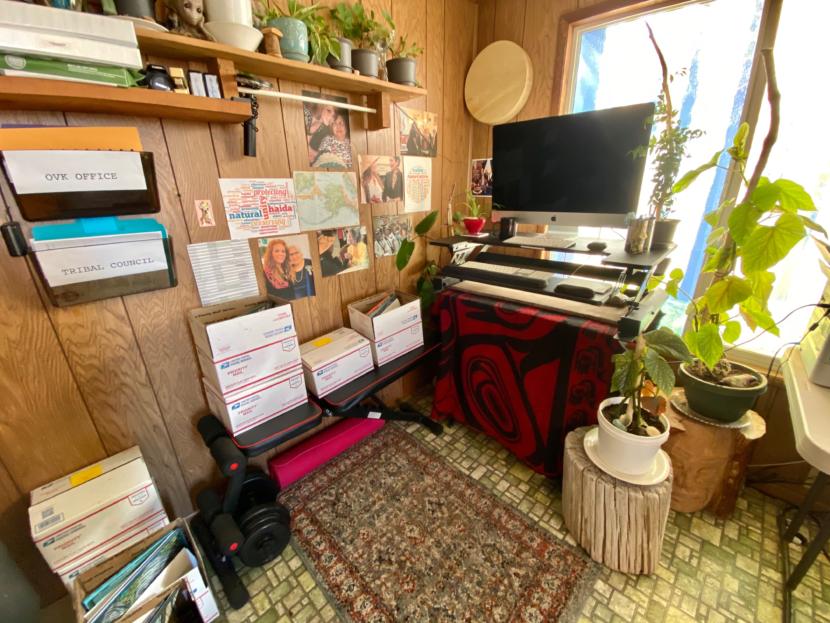
The Trump Administration is still on track to make a final decision this summer on a federal rule that prevents road building in the Tongass National Forest. It could open up more access to logging. But tribal governments across Southeast Alaska say the entire process has been fraught, and while everything else seems to have slowed down because of COVID-19, federal officials are moving ahead quickly with their plans.
Marina Anderson, the Vice President of the Organized Village of Kasaan on Prince of Wales Island, says she’s felt rushed for the entire two years this most recent Roadless Rule discussion has played out. Technology issues have been a major hindrance.
When the U.S. Forest Service held its first public meeting on Prince of Wales Island in 2018, Anderson didn’t find out until the eleventh hour.
“We finally got our mail, and I opened it up, and I showed it to our administrator at the time, and she looked at me with big eyes,” Anderson said. “And she’s like, ‘get in the car we gotta go!'”
Kasaan’s internet was spotty at best so the tribal government relied on an actual mailbox to stay connected. Anderson had to hurry to make the meeting — a two hour drive away.
Kasaan is supposed to be providing important feedback on the Roadless Rule decision to top federal officials. Like the State of Alaska, it’s a cooperating agency. But unlike the state, it’s recommendations haven’t made it into the final draft, which is now under consideration in Washington D.C.
Kasaan wants the Roadless Rule to stay in place. However, the Tongass National Forest could be totally exempted from the federal rule. And that’s at odds with the requests from several tribal governments across the region, who rely on the forest for food. Anderson worries history could repeat itself, and this could lead to more logging — damaging deer habitat and salmon streams on the island.
“It’s been taken advantage of for so long,” she said.
Now, a final Roadless Rule decision is just weeks or months away. There’s also a global pandemic going on.
Anderson says this is not a good time for the U.S. Forest Service to hold a government consultation meeting. But the agency scheduled one with tribal governments anyway.
“To try to host a video conference consultation is completely inappropriate during a pandemic when everyone is trying to take care of their own,” she said.
Anderson is currently working from home — in an old float house where she lives, a remnant leftover from the industrial logging days.
Our conversation breaks up several times on both of our ends during the voice-only Zoom call for this story. And it’s one of the reasons the Organized Village of Kasaan asked to have a meeting with federal officials postponed: It’s hard to communicate the enormity of something between dropped sentences and long pauses.
But in the end, the U.S. Forest Service meeting wasn’t rescheduled. It happened over the phone in late April. Anderson says not everyone showed up which was sad. In total, nine tribal governments have requested the feds hit pause on the Roadless Rule decision while the pandemic unfolds.
Don Hernandez from the Alaska Regional Subsistence Advisory Council has asked for that, too.
“They’re listening to us, but they’re not hearing what we have to say,” Hernandez said. “Because what we have to say has already been discounted from the start.”
Recently, a records request obtained by Southeast Alaska Conservation Council showed an unreleased federal report, detailing 96% percent of the people who weighed-in want to keep the Roadless Rule in place.
Kasaan’s Tribal Vice President says she’d like to see more acknowledgement of that reflected in the final decision making. But the whole process, including a push for a meeting during a global pandemic, has felt disrespectful.
“I want them to say, ‘we heard you voice your opinion,'” Anderson said. “‘We heard all your comments. They were impactful. Keep coming to the table when we have proposals so your voice can be heard again.'”
In a written statement, the U.S. Forest Service said it was “aware” of the tribes’ request to pause working on the Roadless Rule because of COVID-19. But the agency is still moving ahead. “No delay has been announced.”